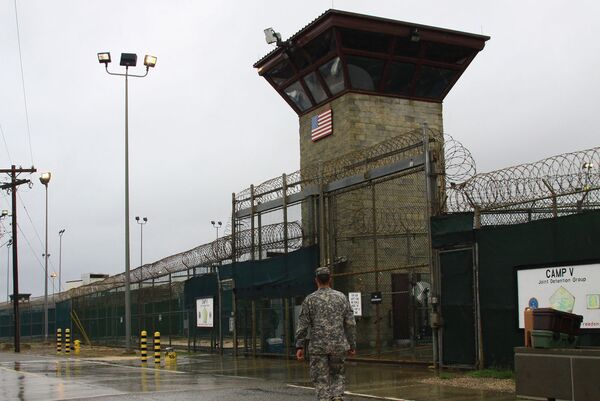MOSCOW, August 26 (RIA Novosti) - War criminals awaiting trial at the detention center operated by the International Criminal Court in The Hague are treated better than detainees at the Guantanamo Bay detention camp, The New Republic reported Tuesday.
“The legal requirements for the detention facilities at The Hague and at Guantanamo are identical, but the conditions of imprisonment are nothing alike,” Jessica Schulberg, an investigative reporter for The New Republic, said.
A comparison of the two detention centers carried out by Schulberg shows major differences in the treatment of detainees.
While prisoners at The Hague are free to move around in the building from 7:30 a.m. to 9 p.m. and use the kitchen, gym, library and spiritual room, inmates at Guantanamo’s Camp Seven, the most secure camp in the detention center, are only allowed to spend four hours a day in a recreation room, accompanied by one other prisoner. Solitary confinement also prevents detainees from engaging in group prayer, an important part of Islam.
Guantanamo also forbids visits and phone calls, while The Hague permits visits and even assists prisoners’ families with travel expenses when needed. Detainees at The Hague are also allowed to make phone calls and send letters. Guantanamo inmates may send letters as well, but communication is slow and limited, Schulberg writes.
Lawyers are usually not allowed into Camp Seven. Defense attorney James Connell, who was granted rare access to the secret detention facility in 2013, later told reporters that conditions in the camp failed to meet the standards for preventative detention.
The Hague considers communication between prisoners and defense attorneys to be confidential and does not monitor them. While lawyer-client privilege is formally recognized at Guantanamo as well, defense lawyers have identified listening devices in meeting rooms, Schulberg reports.
Detainees at the International Criminal Court in The Hague have included former Yugoslavian President Slobodan Milosevic and Congolese rebel leader Bosco Ntaganda.
The Guantanamo Bay detention camp, a highly controversial US military prison located in Cuba, has been the subject of harsh criticism since its establishment in 2002. Health workers, inspectors and former detainees have described cruel and inhumane conditions at the camp, including torture.
International law of war allows the detention of enemy combatants, but the treatment of detainees is strictly regulated by the Geneva conventions. Prisoners must be treated humanely and without discrimination on the basis of race, religion, sex or any similar criteria. Violence, torture and humiliation are forbidden.


